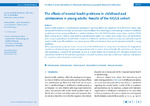The effects of mental health problems in childhood and adolescence in young adults: Results of the KiGGS cohort
Schlack, Robert
Peerenboom, Nele
Neuperdt, Laura
Junker, Stephan
Beyer, Ann-Kristin
Mental health problems in childhood and adolescence may have effects into adulthood. With the KiGGS cohort, data are available for the first time that can be used to track the effects of internalising and externalising problems in childhood or adolescence into young adulthood on a national database. From the KiGGS baseline survey (2003–2006) to KiGGS Wave 2 (2014–2017), a total of 3,546 children and adolescents aged 11 to 17 years were tracked over a period of eleven years into young adulthood. Mental health problems in childhood or adolescence were variously associated with impaired mental health, lower life satisfaction and poorer quality of life and indicators of sexual and reproductive health in young adulthood.
When psychosocial protective factors at the time of the KiGGS baseline survey were considered, the longitudinal correlations of internalising and externalising problems with indicators of mental health, life satisfaction and physical and psychological quality of life decreased, as did, to a lesser extent, the correlations with indicators of sexual and reproductive health and, for externalising disorders, also with low educational status (reference: medium). Implications for prevention and intervention are discussed.
Files in this item

